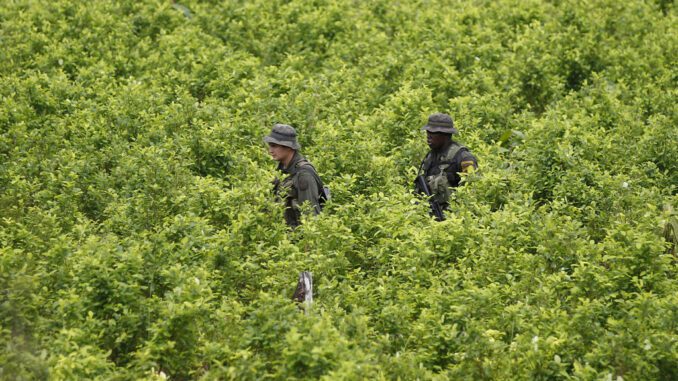
MIAMI — The Biden administration has quietly ditched a key gauge used for decades to measure success in the war on drugs, suspending satellite monitoring of coca crops in Colombia as cocaine production surges in South America.
A State Department spokesperson said the move was “temporary” but gave no timeframe for data collection to resume or explain why it was suspended in the first place. It was also unclear whether satellite surveys would continue in Peru and Bolivia, which together account for about half of coca production in the Andean region.
The move, first reported by Colombia’s El Tiempo newspaper, has drawn outrage from Republicans in Congress from Florida, who have been calling for the president to decertify Colombia’s government for failing to cooperate in U.S. anti-narcotics efforts. But it tracks with leftist Colombian President Gustavo Petro’s efforts to refocus law enforcement efforts away from the rural backwaters where coca is grown to instead chase large-scale smugglers and money launderers who reap the bulk of the drug trade’s profits.
“We are constantly assessing the effectiveness of various counternarcotics efforts and make changes to our efforts as needed,” the State Department spokesperson said in an emailed statement. The spokesperson gave the comment on condition of anonymity, citing agency policy. “We continue to work with the Government of Colombia on the monitoring of illicit coca crops.”
Since at least 1987, the U.S. government has published annual estimates of coca cultivation in Colombia. The numbers soared to an all-time high in 2020, when the U.S. Office of National Drug Control Policy estimated that 245,00 hectares of land — an area three times the size of New York City — was planted with the illicit crop used to make cocaine. Last year’s report showed production was almost unchanged in 2021 from the same high level.
In the first five months of 2023, Petro’s government has manually eradicated just 4,511 hectares of coca — down almost 90% from the 33,454 hectares yanked during the same period a year ago, when the law and order conservative Ivan Duque was still in power.
While the U.S. hasn’t commented on what prompted the policy shift, Republicans have seized on it to attack Petro, a former leftist guerrilla, as he seeks better ties with Venezuela’s socialist government and tries to cut a deal with the nation’s last remaining rebel group.
“This is a gift to the Petro Administration,” Florida Sen. Marco Rubio, the vice chairman of the Senate Select Committee on Intelligence and a senior member of the Committee on Foreign Relations, said in a statement to The Associated Press. “It’s another example of the Biden Administration giving concessions to far-left governments in the region.”
Petro has pushed back, arguing that the U.S. would be wise to refocus its attention on the fentanyl crisis, which is blamed for tens of thousands of overdose deaths.
“Things change,” he wrote in a Tweet this week in response to attacks from Rep. Maria Elvira Salazar, a Miami Republican who chairs a subcommittee of the House Foreign Affairs Committee dealing with Latin America. Without directly addressing questions about the future of the U.S. coca monitoring effort he said “the structure of drug consumption is changing for the worse, reducing demand for cocaine, which is starting to flow to other parts of the planet.”
Adam Isacson, the director for defense oversight at the Washington Office on Latin America, said that satellite monitoring of coca crops offers valuable insights into Colombia’s ability to assert state control in remote, economically depressed areas that have long been dominated by illegal armed groups.
But as a tool for estimating cocaine flows it’s less reliable than other measures that have remained mostly stable in recent years like data on cocaine purity, street prices and overdose deaths. Additionally, the United Nations in conjunction with Colombian authorities annually conducts its own survey of coca cultivation that combines satellite data with on-the-ground verification.
Still, he suspects politics also may have played a role in the U.S. decision to pull the plug.
“If you put a lot of weight on hectares you’re on a collision course with the Petro government, which doesn’t want to make eradication the center of its narcotics strategy,” he said. “The U.S. may be calculating it doesn’t need a major irritant with its closest military ally in the hemisphere.”
The Biden administration has tried to delicately downplay policy differences with Colombia’s first-ever leftist government on narcotics, trade, negotiations with armed rebel groups and sanctions on Venezuela’s socialist government, emphasizing instead the more than two decades of close bilateral cooperation.
The diplomatic dance has yielded some positive results. Petro visited the White House in April and spoke alongside Biden about a “common agenda” to fight climate change and address migration. A few days later, the U.S. said it would launch a processing center in Colombia to handle growing numbers of migrants from Venezuela and elsewhere in South America seeking entry into the U.S.
“We are going down the same river, a river that leads us to ever-greater democracy and ever-greater freedom,” Petro said at the White House.
The State Department spokesperson said that disrupting cocaine trafficking remains a “high priority” because it foments violence, crime and death throughout the hemisphere.
The White House’s drug policy coordination office, which every July releases the coca monitoring report, did not respond to a request for comment.


